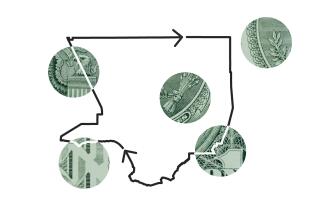Mayor’s Trial : Hoover Aid to Shepard Is Described
- Share via
A former partner in the political consulting firm that ran Mayor Roger Hedgecock’s 1983 campaign testified Monday that former investment executive Nancy Hoover helped fund the company, Tom Shepard & Associates, primarily because she wanted to help Shepard get started in business, not because she was trying to elect Hedgecock as mayor.
As Hedgecock’s felony perjury and conspiracy trial entered its third week Monday, political consultant Robert Meadow said that about 70% of the firm’s staff time was spent on Hedgecock’s prospective mayoral campaign during the late summer and fall of 1982. However, Meadow added, Hoover’s subsidizing of the firm, founded in early 1982 was “absolutely not” related to whether the company ran Hedgecock’s campaign.
In other testimony Monday, Sally Roeder, the girlfriend of Hoover’s brother, Ken Holm, said that Hoover gave her $500 in 1983 to make two $250 contributions to Hedgecock’s campaign in Holm’s and Roeder’s names. Under questioning by Michael Pancer, Hedgecock’s attorney, however, Roeder admitted that to the best of her knowledge, Hedgecock was unaware that Hoover gave Roeder the money to make two contributions.
During most of Monday’s court session, Assistant Dist. Atty. Richard Huffman led Meadow through a lengthy description of the funding and operation of Shepard’s firm during its early months. Meadow, who testified under a grant of immmunity, was named as an unindicted co-conspirator by the San Diego County Grand Jury when, on Sept. 19, it indicted Hedgecock, Shepard, Hoover and former financier J. David (Jerry) Dominelli on charges that they conspired to funnel money illegally into Hedgecock’s 1983 campaign through Tom Shepard & Associates.
Capital Used for Start-up
Meadow told the six-man, six-woman jury that the consulting firm’s partners intended to use Hoover’s capital contributions to cover start-up costs and initial losses “until such time as we became profitable.”
The firm’s partners “felt very fortunate” to obtain Hedgecock as a client, Meadow said, because running a successful campaign “for a major public office... would enhance our reputation and ability to attract new clients.”
Meadow noted that numerous other clients sought the firm’s services after Hedgecock’s victory in the special May, 1983, mayoral election to choose a successor to Pete Wilson.
In an effort to bolster the prosecution’s contention that Shepard’s firm was, from its inception, little more than a vehicle to launder illegal donations to Hedgecock’s campaign, Huffman pressed Meadow for details on how much time the firm spent on then-county Supervisor Hedgecock’s campaign between August and November of 1982. The firm was retained by the Hedgecock campaign in August 1982, in anticipation that then-Mayor Wilson would be successful in his U. S. Senate campaign. Wilson’s victory in the November race created the vacancy in the mayor’s office.
Meadow estimated that 70% of the firm’s time, about 80% of his own time and 85% of Shepard’s time was devoted to Hedgecock’s potential mayoral campaign during that three-month period. However, the firm also did work during 1982 for Richard Roe and Dan Kripke, unsuccessful candidates for the state Assembly and state Senate, respectively, and was actively soliciting other potential clients at the time Meadow added.
Not Very Well-Known
Noting that “we were a small business (and) weren’t very well-known,” Meadow said it was not unusual that the firm had so few clients and, therefore, could devote so much time to Hedgecock’s campaign in 1982. Meadow said it was not unusual that the firm had so few clients and, therefore, could devote so much time to Hedgecock’s campaign in 1982. Meadow reiterated that the firm’s partners viewed Hedgecock’s campaign as a loss leader, hoping that a victory in the mayoral race would generate “an increased demand for our services.”
Citing the fact the firm hired several new employees in 1982, Huffman asked Meadow why Hedgecock’s campaign was not directly charged for company’s staff expenses. Meadow replied that the firm’s staff expenses were “never allocated to any accounts we had,” but rather were considered overhead.
The Hedgecock campaign’s initial August, 1982, contract with Shepard’s firm called for a $750-per-month retainer. Later, after a mayoral race became a certainty, the contract was amended to make the firm’s compensation 15% of all media advertisements bought on Hedgecock’s behalf--a formula that resulted in a $30,000-plus fee.
The firm’s overhead expenses and operating losses were covered by more than $360,000 in investments by Hoover and Dominelli. Meadow, however, said he believed that Hoover was the only investor. He said he was not aware that Dominelli also was pumping money into the firm.
“Did the funding depend upon your getting Roger Hedgecock as a client?” Pancer asked.
“Absolutely not,” Meadow responded.
Hoover made the investments “because she wanted to help Tom Shepard get started in business?” the defense attorney asked.
“Yes,” Meadow answered.
Used Her Dog’s Name
Hoover was listed as a minority partner in Shepard’s firm under the fictitious name of “Cheney and Associates” the name was designed to conceal the financial ties between Hoover and Shepard.
Monthly capital contributions to the firm by Hoover and Dominelli increased from about $12,000 to $20,000 in late 1982 and early 1983--at the height of the mayoral race--and declined in the summer of 1983, after the race concluded. The firm also laid off employees after the race, Meadow testified.
Huffman asked Meadow whether those funding and staff fluctuations were “just a coincidence.” Prosecutors contend that the pattern of monthly investments and staffing levels demonstrate the link between Shepard’s firm and Hedgecock’s race.
“It reflected our increasing profitability as a firm,” Meadow said, adding that new clients drawn to the firm by Hedgecock’s success reduced the need to rely on Hoover’s investments. Those new clients included half of the current San Diego City Council members, Assemblyman Larry Stirling, Supervisorial candidate Susan Golding, a handful of corporate clients and a lucrative contract to run the November, 1983, campaign in favor of a downtown convention center.
Another key element in the prosecution’s case is the contention that Hedgecock improved his relationship with Nancy Hoover in 1982 because he was aware of how her financial assistance to Shepard could help his own mayoral campaign.
Hedgecock’s friendship with Hoover had ended when she left her husband, George Hoover, to live with Dominelli in the late 1970s. However, Hedgecock and Nancy Hoover became reconciled after George Mitrovich, publicist for the now-bankrupt La Jolla investment firm of J. David & Co., broached the subject of a possible rapprochement during a 1981 lunch with Hedgecock and former J. David official Al O’Brien.
During the trial’s first week, O’Brien, the former president of J. David Mercantile, testified that Mitrovich told Hedgecock during the lunch that he should stop being so critical of Hoover for leaving her husband because she “was prepared to to to any end to see that he was elected mayor of San Diego.”
Mitrovich testified Monday that the status of Hedgecock’s and Hoover’s relationship “wasn’t the purpose” of the 1981 lunch. He conceded, however, that the subject came up and the Hedgecock and Hoover resumed friendly relations afterward.
More to Read
Get the L.A. Times Politics newsletter
Deeply reported insights into legislation, politics and policy from Sacramento, Washington and beyond. In your inbox twice per week.
You may occasionally receive promotional content from the Los Angeles Times.










